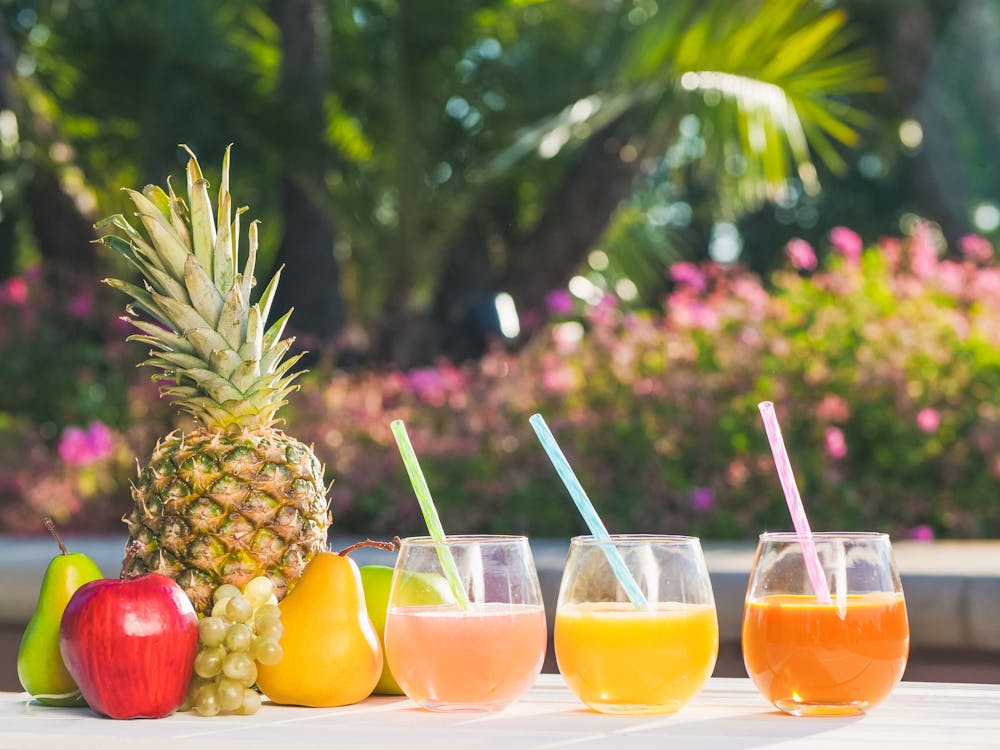Introduction
Drinking natural juice every day can be a beneficial
addition to your diet, but like many things, moderation and context matter.
While natural juices can offer essential vitamins, minerals, and antioxidants
from fruits and vegetables, they also come with considerations such as sugar
content, potential loss of fiber, and the impact on overall calorie intake.
Firstly, let's delve into the positives of incorporating natural juice into your daily routine:
1. Nutrient Boost: Natural juices can provide a concentrated
source of essential nutrients found in fruits and vegetables. These include
vitamins like vitamin C, vitamin A, and folate, as well as minerals like
potassium and magnesium. These nutrients are crucial for overall health,
supporting functions such as immune system function, energy production, and
maintaining healthy skin.
2. Hydration: Many fruits and vegetables have high water
content, making juices an effective way to stay hydrated, especially for those
who struggle to drink enough water throughout the day. Proper hydration is
essential for maintaining bodily functions, regulating body temperature, and
supporting cognitive function.
3. Antioxidants: Fruits and vegetables are rich in
antioxidants, which help neutralize harmful free radicals in the body. Free
radicals are molecules that can damage cells and contribute to aging and
disease. By consuming natural juices, you can increase your intake of
antioxidants like flavonoids, carotenoids, and polyphenols, which may offer
protective effects against chronic diseases such as heart disease and cancer.
4. Convenience: Juicing can be a convenient way to consume a
variety of fruits and vegetables, especially for those with busy lifestyles. It
allows you to pack a range of nutrients into a single serving, making it easier
to meet your daily recommended intake of fruits and vegetables.
However, despite these benefits, there are also some potential drawbacks to consider:
1. Sugar Content: Natural juices can be high in sugar,
especially if they contain predominantly sweet fruits like apples, grapes, or
pineapples. While these sugars are naturally occurring, consuming large
quantities of juice can lead to spikes in blood sugar levels, which may
contribute to issues like insulin resistance, weight gain, and diabetes over
time. It's important to be mindful of portion sizes and opt for juices that
include a variety of vegetables to mitigate the sugar content.
2. Lack of Fiber: Juicing removes much of the fiber found in
whole fruits and vegetables. Fiber is essential for digestive health, promoting
satiety, and regulating blood sugar levels. Without fiber, juices can cause
blood sugar levels to rise more quickly and may not keep you feeling full as
long as whole fruits and vegetables would. To counteract this, consider
incorporating sources of fiber such as chia seeds or flaxseeds into your juices
or consuming whole fruits and vegetables alongside your juice.
3. Caloric Intake: While natural juices can be nutritious,
they can also be calorie-dense, especially if they contain a large number of
ingredients or added fats like avocado or coconut milk. Consuming excess
calories from juices without accounting for them in your overall diet can lead
to weight gain over time. Be mindful of portion sizes and consider
incorporating juices as part of a balanced diet rather than using them as meal
replacements.
4. Cost and Accessibility: Fresh produce can be expensive,
and juicing requires a significant amount of fruits and vegetables to yield a
single serving of juice. Additionally, not everyone has access to fresh,
high-quality produce year-round, which can make juicing less practical or
affordable for some individuals.
In conclusion,drinking natural juice can be a healthy
addition to your diet when consumed in moderation and as part of a balanced
eating plan. It can provide essential nutrients, hydration, and antioxidants,
but it's important to be mindful of the sugar content, lack of fiber, and
potential impact on overall calorie intake. Incorporating a variety of fruits
and vegetables into your juices and balancing them with whole foods can help
maximize the health benefits while minimizing potential drawbacks. As with any
dietary choice, it's best to consult with a healthcare professional or
nutritionist to determine the most appropriate approach for your individual
needs and goals.

